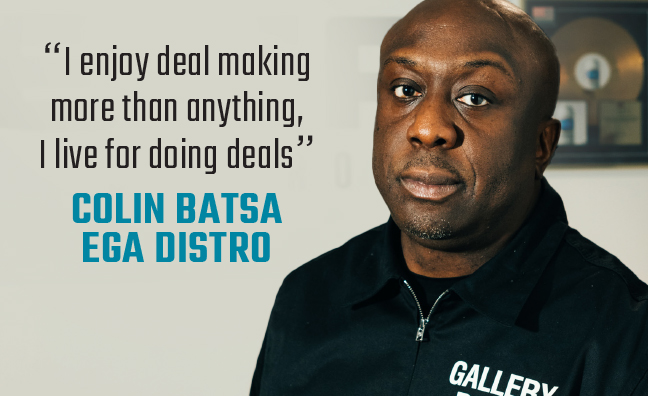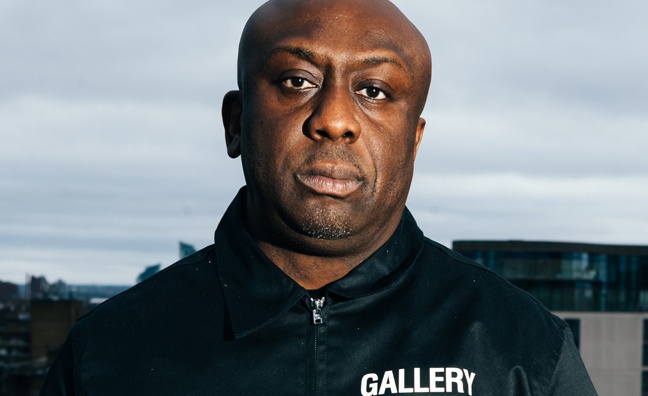Colin Batsa has laid out his grand plan for EGA Distro in a new interview with Music Week.
Alongside his business partners Victor Omos and Charley Snook (who initially joined Batsa as an intern), he relaunched EGA Music Group as EGA Distro in 2023. Speaking alongside his team in the new issue of Music Week, Batsa stated that the company’s mission is two-fold.
“The main one would be to show the industry that Black people and women can make empires, not just middle-class white men,” he said. “Our cultural statement and policy is to provide a company for any artist in our genre that comes from any background where they are not discriminated against or looked down upon. If they’ve come out of prison, if they’ve come from a poor background, if they’ve not had opportunities, whatever they are, as long as they make rap, R&B and Afrobeats, we will try and help.”
The relaunched EGA Distro now has backing from Virgin Music Group and Universal Music and counts D-Block Europe, Nines, Potter Payper, Marnz Marlone, Lifesize Teddy, Kirky, Mazza_L20 and Zino Records as services clients, while its label arm releases music by Digga D, M Huncho, K Trap, Skrapz and Sharna Bass. EGA has three nods at the Music Week Awards 2024.
It achieved chart-topping success with D-Block Europe back in January as the duo hit No.1 with Rolling Stone to reclaim their title as the British rap act with the most Top 10 albums chart entries, with eight in total.

Batsa opened up about the intricacies of running a label and services company side by side.
“The structure of the deal is the structure of the deal, but having a good team, whether it’s an independent label or as a distributor, will give you great results, because democracy in music is at such a high level that no company can do anything,” he said. “If the artist doesn’t connect, they don’t connect. Once they connect, we pour gasoline on it and try to get as big as we can. Or we help them connect by presentation. But it’s all down to the people and the music.”
He also opined that there is “a thin line” between what majors and independent can offer.
“Everyone does things differently,” said Batsa. “I suppose a label gets involved in the music way more than a distributor does, but that’s just structure. You can ask any label right now, they would rather sign an artist that already has the music because that’s a cheap alternative for them. So what is really the difference? You can’t tell me internationally the label does better, because in our genre, our biggest artist globally last year was Central Cee and he was signed to ADA.
“And from my point of view, the biggest Afrobeats record last year – Rema’s Calm Down – which I signed to Virgin independently, was a global hit, five times platinum in America, double platinum in the UK. In the same way, people shouldn’t diss a major label, there are great success stories, they work hard, they have a good system. When something’s going big, they know how to make you really big. So it all comes down to the artist, the vision and the plan. That’s all that matters.”
Batsa is bullish about EGA Distro’s position in the industry.
“In rap music, every major label must see me as a big competitor because of my roster and my flexibility,” he said. “I’m not as big or as experienced as a major, so they have that over me. It’s like sport – different teams will compete, it’s great. So they definitely are competing with us, but there’s also enough room for both. I do think they are investing more in smaller companies, but I think they’ve always done it.”
Batsa said that the independent route suits the current wave of Black music acts in the UK.
“In the UK, it’s more like rappers on distribution [deals], like D-Block Europe, Dave… Stormzy was on distribution,” he said. “They’re still working with majors, but I just feel for our genre, smaller teams are more suited for that. It’s not dissing anyone. I’m sure that in other genres, other companies or teams are better. But in rap music, especially UK street music, the smaller, more flexible and more agile the company, the better for the artist. That’s what I think Universal is great at, they just know, ‘Okay, if you’re the best person for this role, let’s partner and we’ll give you the muscle that you need,’ because it’s a people’s business. These kids don’t sign to companies, they sign to people.”
Batsa, who is now working with former XL and Warner act Nines, said there is no secret to propelling acts to mainstream success.
“It’s just letting the artist be themselves, trying to take their vision to another level,” he explained. “I’ve always made [sure] the artist is not afraid to dream for the biggest thing. Even though we’re street, we can have a hit. We can go platinum. We can be in the charts. We can be in people’s cars. With D-Block, I was very lucky to have them blow up, Nines is a superstar without me, so I’m lucky to have that. But the ones that have been there from day one, like Digga D, Rema, Potter, it’s just the confidence that we can take this music to the mainstream, even in its rawest form.”
Batsa also noted that the role of the A&R is changing in today’s landscape.
“I enjoy the deal-making part more than anything, I live for doing deals,” he said. “There was a perception of A&R, that you had to sit in the studio, make the records. There’s a new type of A&R where you’re a deal breaker and you help maintain what’s going on; you’re involved in marketing, you’re involved in streaming and you’re involved in creative.”
Read the full interview in the new issue of Music Week, out now. Subscribers can read it online here.
PHOTOS: TJ CHARTERS









